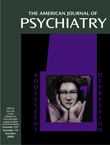γ-Hydroxybutyrate Withdrawal and Chloral Hydrate
To the Editor: γ-Hydroxybutyrate, a natural catabolite of γ-aminobutyric acid (GABA), is sold illegally as a euphoriant (1). An overdose of this drug of abuse can cause coma and death (2). Reports of severe and difficult-to-treat withdrawal syndromes are also emerging (3). We describe a case of γ-hydroxybutyrate withdrawal symptoms abruptly interrupted by chloral hydrate therapy.
Ms. A, a 20-year-old woman, came to the emergency room requesting help in discontinuing γ-hydroxybutyrate. Initially a casual user, she had escalated her use of γ-hydroxybutyrate to every few hours around the clock over the prior 4 months. Over several weeks she had lost 20 lb, and her mood had deteriorated into crying spells. Although she had experimented with other illicit substances, she had used only γ-hydroxybutyrate and marijuana in the previous 2 weeks.
At her admission examination Ms. A’s pulse of 114 bpm was the only remarkable physical or neurological finding. A mental status examination found no notable abnormality in cognition, thought processing, or thought content. The results of her laboratory tests uncovered only a urine drug screening that was positive for benzodiazepines after she received a dose of lorazepam.
By the second hospital day Ms. A’s mental status had begun to deteriorate. She responded continuously to hallucinations in all sensory modalities. She did not sleep and was oriented only to person. Doses of lorazepam and haloperidol, each up to 10 mg over 24 hours, had no clear effect on her insomnia, irritability, and hallucinations. Her persistent tachycardia was never higher than at admission. She developed mild diaphoresis, dilated pupils, and a moderate resting tremor.
After Ms. A had 5 nights without sleep, little food intake, and no improvement in her dramatically high levels of delirium and psychosis, consideration was even given to general anesthesia. Before more extreme measures were taken we initiated a trial of chloral hydrate. After receiving 1500 mg, Ms. A fell asleep and slept almost 24 hours, during which she took two more doses of chloral hydrate, 1000 mg, as soon as she roused during that period.
The next morning Ms. A was alert, fully oriented, amnestic for the period since admission, and free of hallucinations. She slept well the next few nights while taking chloral hydrate. During a brief recurrence of much milder hallucinations she responded minimally to a dose of haloperidol, but by discharge, after a 10-day hospitalization, they had disappeared, and she was sleeping well.
γ-Hydroxybutyrate withdrawal can develop rapidly and resist pharmacologic interventions, including high doses of benzodiazepines. In this case chloral hydrate appeared to rapidly reduce levels of delirium and psychosis, perhaps by its effect on the severe insomnia seen during γ-hydroxybutyrate withdrawal. Chloral hydrate is rapidly metabolized into trichloroethanol, the active form, which has an unknown mechanism of action. In the brain, γ-hydroxybutyrate receptors have been identified, and γ-hydroxybutyrate has been found to affect dopamine release. However, little else is clear about its effects. In summary, this increasingly popular drug of abuse has dangerous characteristics, and effective treatments for acute related problems are lacking. Chloral hydrate may have some specific efficacy for γ-hydroxybutyrate withdrawal symptoms.
1. Ropero-Miller JD, Goldberger BA: Recreational drugs: current trends in the 90s. Toxicology 1998; 18:727–746Google Scholar
2. Viera AJ, Yates SW: Toxic ingestion of gamma-hydroxybutyric acid. South Med J 1999; 92:404–405Crossref, Medline, Google Scholar
3. Hernandez M, McDaniel CH, Costanza CD, Hernandez OJ: GHB-induced delirium: a case report and review of the literature of gamma hydroxybutyric acid. Am Drug Alcohol Abuse 1998; 24:179–183Crossref, Medline, Google Scholar



